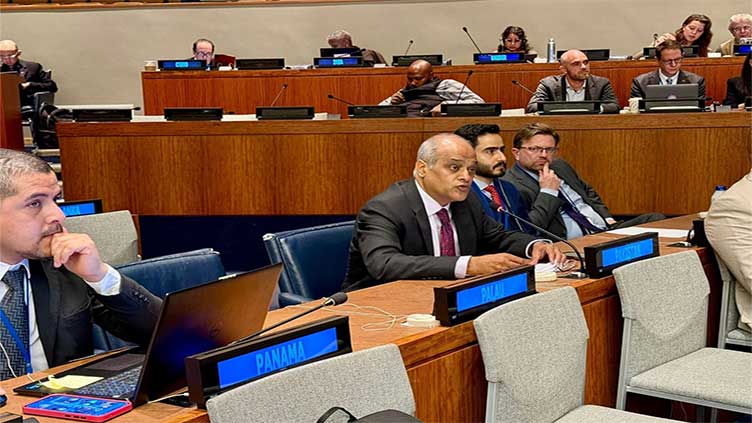Pakistan warns of hitting back at India with 'greater ferocity' if attacked again

Pakistan
South Asia requires a future shaped by cooperation, not confrontation, Ambassador Bilal Ahmad said.
GENEVA (APP) - A senior Pakistani diplomat has warned India that it will respond with "greater ferocity and resolve" if aggressed again as he drew attention of the UN Conference on Disarmament in Geneva to the recent hostilities between the two South Asian nations.
"South Asia does not need another crisis -- It requires a future shaped by cooperation, not confrontation," Ambassador Bilal Ahmad, permanent representative of Pakistan to the UN offices in Geneva, told the 65-member forum established by the international community to negotiate arm control and disarmament agreements.
"If India chooses the path of aggression again, the consequences -- and the responsibility -- will lie entirely at its door," he said, warning, "Pakistan will stand ready to meet any Indian aggression at every escalating level with greater ferocity and resolve".
Pakistan, Ambassador Bilal Ahmad added, will adhere to the ceasefire, pointing out that its preference remains unchanged: constructive engagement, result-oriented dialogue, and the peaceful resolution of all outstanding disputes, including the Jammu and Kashmir dispute, in accordance with UN Security Council resolutions.
He said that India’s illegal threat and use of force against a nuclear-armed neighbour, now in shape of the Indian leadership’s revisionist posture -- the so-called “new normal” -- poses a serious threat to strategic stability in South Asia.
The Ambassador cited a growing list of destabilizing developments: India’s deployment of nuclear weapons at sea, its testing of anti-satellite weapons, canisterization of missiles, and a shift toward a counterforce posture.
These, he noted, were “not contours of credible minimum deterrence but preparation to project power far beyond South Asia.”
“For over a decade,” Ambassador Bilal Ahmad said, “Pakistan has warned this Conference of India's hegemonic mindset and refusal to coexist peacefully with sovereign neighbours. This mindset has further hardened under the influence of the ruling Hindutva ideology that aims to reconstruct history, demography, and reshape geography.”
He emphasized that India’s recent actions were not isolated but part of a “strategic posture” that “thrives on reckless overconfidence in military imbalance,” driven by “unchecked violations of international law,” “hate-fueled populist rhetoric,” and “delusional expert analyses.”
“No other nuclear weapon state behaves with such recklessness,” the envoy asserted. “No nuclear-armed state fires high-speed, dual-capable missiles across international borders into the territory of another nuclear power.”
The statement also highlighted that India invokes the terrorism bogey to mask its geopolitical ambitions of projecting regional power and hegemony, using military force as a coercive tool of state policy.
In this regard, Ambassador Bilal Ahmad expressed concern over international permissiveness toward India’s buildup, citing how export control regimes had “bent their rules,” giving India access to sensitive technologies while holding Pakistan to “phantom commitments divorced from strategic realities.”
He called upon states engaged in defence cooperation with India to understand and recognize the consequences that the weapons and technologies they transfer to India today may well be used tomorrow in acts of aggression against civilians and in violations of IHL (International Humanitarian Law).
Ambassador Ahmad called on the international community to uphold the UN Charter and support diplomacy over confrontation, stressing that “South Asia does not need another crisis. It requires a future shaped by cooperation, not confrontation.”
Reacting to Indian delegate’s reference to so-called “nuclear blackmail”, a Pakistani delegate said that such self-imposed claims are made to hide India's own nuclear delinquency.


